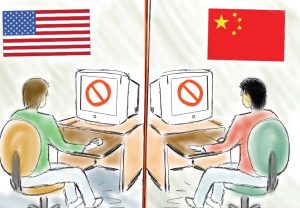 For example, the filters blatantly contradict their mission statement of building a “collaborative culture that values students…as partners in learning.” If the District were concerned about the future of its students, they would embrace social networking as a productive learning tool. The District contradicts their mission statement by denying students the opportunity to learn how to use technology for the 21st century. By censoring websites instead of providing Internet training, the Administration robs students of necessary online experience in a world where Internet start-ups and social media directors are viable career choices. If the District’s main issue is bandwidth, they need to spend money on that instead of restrictive Internet filters in order to prepare students for what awaits them outside of school. With 250 megabytes of bandwidth to disperse across the entire School District, Technology Director Ray Eernisse even said that social media sites would not take up a concerning amount of bandwidth. Therefore, the District has no reason to restrict social media websites that don’t take up a significant amount of bandwidth and don’t harm students.
For example, the filters blatantly contradict their mission statement of building a “collaborative culture that values students…as partners in learning.” If the District were concerned about the future of its students, they would embrace social networking as a productive learning tool. The District contradicts their mission statement by denying students the opportunity to learn how to use technology for the 21st century. By censoring websites instead of providing Internet training, the Administration robs students of necessary online experience in a world where Internet start-ups and social media directors are viable career choices. If the District’s main issue is bandwidth, they need to spend money on that instead of restrictive Internet filters in order to prepare students for what awaits them outside of school. With 250 megabytes of bandwidth to disperse across the entire School District, Technology Director Ray Eernisse even said that social media sites would not take up a concerning amount of bandwidth. Therefore, the District has no reason to restrict social media websites that don’t take up a significant amount of bandwidth and don’t harm students.
Even if the District bought the filter with intentions to block inappropriate material, it can’t even do that. It blocks useful Internet tools haphazardly categorized as inappropriate, while not always blocking actual inappropriate material. While searching on a school computer for pictures of “The Vow” to review in the paper, the editorial staff came across a picture of a naked person. But while searching for a Fray album cover with three, fully-clothed men running across a field, we were blocked for “pornography.”
The debate team recently ran into a snag while researching the new Lincoln-Douglas debate resolution. The website was blocked because of “violent material.” If the filter deems intellectual topics on foreign policy too violent for high school students, then how will students ever be ready to handle critical thinking situations if they aren’t exposed to them in a safe environment?
Whether FHSD likes it or not, students are growing up in a digital generation. If a student abuses social media at school, then that should be handled on an individual basis. It should not be an issue that the District needs to address because they have larger problems on their hands. Teachers are perfectly capable of enforcing this, just as they enforce the new cell phone policy- and every other rule in the code of conduct- that allows students to use smart phones as tools in class.
Because the Internet is an educational tool, limiting it only limits the quality of education for students. Censorship does not promote the free exchange of ideas, does not provide an open environment for learning and does not make way for a modern education.




![Solve the Real Problems Instead of Banning Phones [Editorial]](https://FHNtoday.com/wp-content/uploads/2025/03/Untitled_Artwork-1-e1742221427133-1200x686.jpg)
![More Education is Needed Around the Idea of Book Banning [Editorial]](https://FHNtoday.com/wp-content/uploads/2025/03/shutterstock_2411069809-1200x800.jpg)
![It's Time to Prioritize Futures Not Finals [Editorial]](https://FHNtoday.com/wp-content/uploads/2025/01/Untitled_Artwork-1-1200x527.png)
![It's Time for the BOE to Respect Student Input [Editorial]](https://FHNtoday.com/wp-content/uploads/2024/11/Untitled_Artwork-1-1200x690.png)
![It's Time For a Change to Knight Time [Editorial]](https://FHNtoday.com/wp-content/uploads/2024/10/Untitled_Artwork-30-1200x900.png)
![The Time for Media Literacy Is Now [Editorial]](https://FHNtoday.com/wp-content/uploads/2024/05/IMG_1035-1200x737.jpg)

![Banning Bitter Truths [Opinion]](https://FHNtoday.com/wp-content/uploads/2025/03/A5420F3C-5A62-4390-A0DE-112E5DAFB16D-e1743114102833-1200x1128.jpg)
![Si Pudiera Devolver el Tiempo [Personal Column]](https://FHNtoday.com/wp-content/uploads/2025/03/Untitled-design-1200x675.png)
![A Mock Trial Christmas [Personal Column]](https://FHNtoday.com/wp-content/uploads/2025/03/Copy-of-Mckenna-Hudson-Tales-of-a-child-delinquent-6-1200x800.png)
![A Visit Inside An Artist's Mind [Personal Column]](https://FHNtoday.com/wp-content/uploads/2025/03/Copy-of-Mckenna-Hudson-Tales-of-a-child-delinquent-5-1200x800.png)






